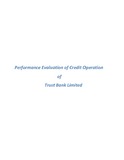| dc.description.abstract | Today necessity of a Bank as a financial institution is undeniable. A country is financially rich when it has modern financial institutions of its own. These institutions play a vital role in the field of financial stability of a country. Banking sector is one of the stable financial institutions of a country. Due to Globalization and Technological changes, the banking business has become very competitive now a day. All banks are competing to give effective real time service to their customers. For giving friendly service to the customers they need experienced and well-educated working force.
The overall approach of the report is a Descriptive one as it goes into the depth of “Performance Evaluation of Credit Operation Systems of Trust Bank Ltd”. Here both primary and secondary information were used. Interview was the basic techniques comply to collect primary data from any people within the organization. Information about the varieties of activities within the Correspondent Banking Department was collected through interviewed. Among the secondary sources to collect data regarding the company’s performance over the Annual reports of Trust Bank Ltd. Different circulars and papers of Trust Bank Ltd, General Banking Operation manual, Banking Lecture sheet within the organization helped me to gather data about the organization.
The principal reason banks are chartered by the government and the central bank is to make loans to their customers. Banks are expected to support their communities with an adequate supply of credit for all legitimate business and consumes financial needs and to price that credit reasonably in the line with competitively determined interest rates. In deed, making loans is the principal economic function of banks to fund consumption and investment spending by businesses, individuals and units of government. How well a bank performs its lending function has a great deal to do with the economic health of fits region, because bank loans support the growth of new businesses and jobs within the banks trade territory and promote economic vitality, Moreover, bank loans often seem to convey positive information to the marketplace about a borrower’s credit quality, enabling a borrower to obtain more and perhaps somewhat cheaper funds from other sources. The report contains seven chapters. The first chapter of the report describes the introductory words of the internship report in which Introduction of Topic, Origin of the report, Objective of the Report, Scope of the Report, Methodology, and Data Analysis and Organize & Limitations. The second chapter contains the Background of “Trust Bank Ltd.”, Organization Structure of “Trust Bank Ltd.”, Vision of “Trust Bank Ltd.”, and Mission Statement of “Trust Bank Ltd.” In third chapter, it contains the Theoretical framework. In chapter four, it contains Analysis of Credit Operation of Trust Bank Ltd and chapter five contains Ratio Analysis and Frequency Analysis & Findings.
Different Problems, suggestions, recommendations have come at the end of the report. TheProblems findings during the three-month internship period & suggestions are given from
observation, comparative analysis, strategic point of view etc. In fine, this paper contains some findings and recommendations, which may be helpful for the Bank.
TBL has gained success from the very beginning of their operation and was capable enough to hold the success year after year. It gained success very early because it has a very strong backup to provide it financial support and they are the army welfare trust. The credit portfolio of the bank is a mix of scheme loans, micro credit, marriage loan, car loan, and commercial loans. Commercial loans comprise trade financing in the form of working capital and other funded and non-funded credit facilities. The bank has a classified loans and advances much lower (3%) than the national average (30%).The bank as a matter of priority it wants to ensure the quality of its loans portfolio by strengthening post disbursement recovery measures as well as by prioritizing on Early Warning System (EWS) to check the growth of non-performing assets. | en_US |

